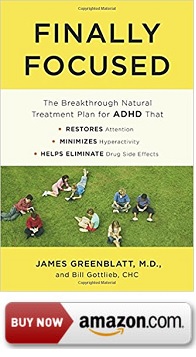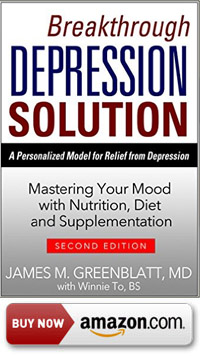Dr. James Greenblatt, Former Chief Medical Officer, Monte Nido Walden
As the former Chief Medical Officer for Monte Nido Walden, Dr. James M. Greenblatt provided medical management, leadership, and oversight of Walden’s eating disorder programs. Working with thousands of children, adolescents and adults, Dr. Greenblatt found that each individual has a unique biochemical profile, range of behaviors and treatment needs. He has since retired from his position at Monte Nido Walden.
Dr. Greenblatt is board-certified in child and adult psychiatry. He received his medical degree and completed his adult psychiatry residency at George Washington University in Washington, D.C. He completed a fellowship in child and adolescent psychiatry at Johns Hopkins Medical School. In addition, Dr. Greenblatt is a clinical faculty member in the psychiatry department at Tufts Medical School. He lectures extensively throughout the United States and Canada on integrative therapies for mental health.
He is the author of several books, including: “Answers to Anorexia,” which draws on his many years of experience and expertise in integrative medicine and treating eating disorders, “The Breakthrough Depression Solution,” which outlines a personalized nine-step method for beating the physical causes of depression; “Answers to Binge Eating,” which confronts a mistaken understanding of why people struggle with weight management and introduces biological solutions for rebalancing appetite and eating patterns; and “FINALLY FOCUSED,” which helps parents understand and eliminate the risk factors around their child’s ADHD symptoms.
Books By Dr. James Greenblatt
FINALLY FOCUSED
ADHD – a disorder affecting 7 million American children and 8 million adults – is not a “behavior” or “discipline” problem, but a medical disorder in which nutritional, neurological, genetic and other factors imbalance the brain, causing imbalanced behavior. To restore balance, every person with ADHD requires unique natural and medical treatments.
FINALLY FOCUSED provides those treatments. Each chapter is organized as a step-by-step healing plan, in which Greenblatt first helps parents understand the factors underlying their child’s ADHD symptoms – and then shows them how to eliminate those factors, one by one. (Adults with ADHD can do the same on their own.) If medication is necessary, the Plus-Minus Healing Plan can minimize or even eliminate side effects.
Answers To Binge Eating
In Answers to Binge Eating, respected psychiatrist and eating disorder expert Dr. James Greenblatt explains how appetite is controlled by the brain’s neurochemical systems, which rely on specific proteins for optimal functioning.
The New Hope model described in this book combines the best in traditional and complementary approaches for recovery from appetite disturbances, food addiction, and binge eating. While dieting providers a temporary fix, this book will offer a permanent solution based on scientific research to help you reclaim a healthy appetite with food.
Following the New Hope model, you will find your answers to appetite control and get off the roller-coaster ride of food addiction.
The Breakthrough Depression Solution
The Breakthrough Depression Solution offers patients and their families’ new hope for sustained recovery from depression.
Depression, a disabling illness that threatens to become the major cause of disability worldwide by the year 2020, is surprisingly common, affecting over 15 million individuals in the United States alone. But the statistics regarding recovery are dismal. Standard treatment for depression successfully eliminates symptoms in only 33% of patients, and in roughly 70% of those with depression, it recurs.
In The Breakthrough Depression Solution, Dr. Greenblatt offers a new approach to this devastating and debilitating illness grounded in personalized medicine. The fundamental premise of this approach focuses on medicine tailored to each individual. Just as personality and appearance is unique, so are the factors that contribute to depression. Focusing on personalized medicine, Dr. Greenblatt concentrates on nutrition, genetics, stress, and when needed, technology to ensure that medications and treatment are targeted towards individual biochemistry. By identifying and addressing all the factors that contribute to depression, depression can be successfully treated!
Answers to Anorexia
Answers to Anorexia offers patients and families new hope for the successful treatment of this serious, frustrating, and enigmatic illness. It proposes the first new treatment plan for anorexia in fifty years.
Anorexia is a medical illness of starvation that causes malnutrition in the body and the brain. This self-starvation disease affects approximately 1-5% of young women in the U.S., (and is increasingly common among middle-aged women as well as men).
While psychiatry treats major psychiatric illness with medications – not one drug is FDA-approved to treat anorexia! Antidepressants are commonly prescribed, but have been proven ineffective for treating anorexia. Answers to Anorexia addresses the challenge of successful treatment by providing an integrative medicine approach to this devastating illness.
Answers to Anorexia offers readers highly accessible information that may be helpful as either self-help or as an adjunct to professional treatment. It provides a holistic treatment plan involving an integrative medicine approach for men and women with anorexia. The treatment plan centers on restorative nutrition and precise medication for the many symptoms and illnesses that often accompany this life-threatening disease such as depression and anxiety. To be successful, Dr. Greenblatt explains, treatment needs to correct the physical damage and brain dysfunction of malnutrition.
Speaking Engagements and Events
Blog Posts by Dr. James Greenblatt
Help! My Phone Trapped Me In Disordered Eating!
I’m going to discuss and review a few applications. Some I suggest you ignore. Or delete. And some I think you should know about.
Are You Listening To What Your Body Has To Say?
As I stood in the kitchen feeling sick, I realized that if my body isn't well, I won’t be productive and none of the things I need to get done will happen correctly. So, I decided to listen to my body and go lie down and rest. As I lied in bed I said to my body, “sorry for almost blowing you off.” When I was with Ed, he would make me feel guilty for taking care of myself and listening to my body…not now…now that I am recovered I take care of myself and my body and you can too!
Whose Voice Are You Listening To?
In eating disorder treatment and recovery, people often talk about the eating disorder’s “voice.” Sometimes patients and family members are initially wary of this language, wondering if they are “hearing voices,” and whether that means they are “crazy.” However, that’s not the case at all!
Listen to Your Body – React with Kindness, Care, and Love
One day last week out of the blue my back decided to give me some trouble. So much so that it was very hard for me to walk. I put a plan in place to take care of what my body was telling me. I took some medicine, called my massage therapist, did some yoga postures, iced my back, and got some rest. All of these things were necessary to get me feeling better and on my feet again. I listened to what my body was telling me and I reacted with kindness, care, and love.
Learning The Lingo of Eating Disorder Treatment
To the uninitiated, many of the things said about eating disorder treatment can be confusing. “Insiders” (staff and established patients) use words and phrases that may be unfamiliar. Whether you are a first-time patient, a family member, friend, or outside provider, “learning the lingo” can go a long way in demystifying the treatment process. Here is an introduction to some of the most common terms you may encounter.
Why Is Eating Disorder Treatment Making My Daughter More Anxious?
During the first week of treatment, she had temper tantrums, like a three year old, rambling on about the most irrational statements, misquoting her doctor to suit her eating disorder’s agenda. At one point, she put her fingers down her throat in an attempt to purge her snack before we drove to treatment. This was devastating to me and my husband because she used to purge when her eating disorder began, but I could safely say before treatment she hadn't purged for months.





